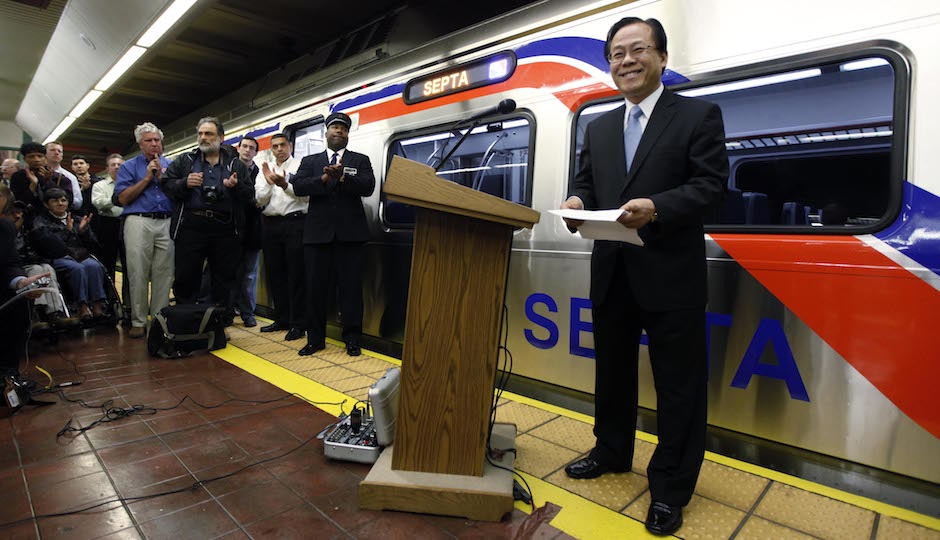The Company That Built SEPTA’s Faulty Railcars Wants Another Contract

Hyundai Rotem president and CEO Min Ho-Lee is seen after making remarks in front of a new Silverliner V passenger train car in Philadelphia in 2010. | Photo by Matt Rourke/AP
It’s been just three years since Hyundai Rotem completed the work on 120 new SEPTA Regional Rail cars, and now all of them have been taken out of service indefinitely.
SEPTA announced over the weekend that it was removing the new Silverliner V cars from service after an inspector found fatigue cracks in an equalizer beam, a critical element that helps keep the railcars from tipping over. The agency then began inspecting all Silverliner Vs and concluded that the defect is structural. The problem, which develops over time through repeated stress on the cars, affects 95 percent of the new vehicles, according to SEPTA. They’ll be sidelined until the agency can figure out how to address the issue.
The Silverliner V cars were manufactured by Hyundai Rotem, a South Korean company that set up a plant in South Philly after winning a contract from SEPTA. The contract was troubled from the outset. After SEPTA selected Hyundai Rotem as the winning bidder in 2004, another business, Kawasaki, sued the agency, saying it had improperly selected a less experienced company, according to reports in the Inquirer. SEPTA later agreed to re-bid the contract, and Hyundai Rotem was selected again.
Delays plagued the process. Cars were delivered late, and Hyundai Rotem ended up paying about $13 million in late fees, which were calculated at $200 per car, per day. The Inquirer reported on work problems at the company’s South Philly plant, with widespread miscommunication between Korean managers and American workers, and workers lodging complaints with the National Labor Relations Board.
According to several reports in 2010, the Silverliner V cars were also delivered about 10,000 pounds overweight. That said, the extra weight of the cars likely did not cause the fractures in the equalizer beams, SEPTA’s assistant general manager, Ron Hopkins, said at a press conference Tuesday. The cars weigh around 146,000 pounds total, Hopkins said.
Hyundai Rotem is currently trying to obtain another SEPTA contract to manufacture double-decker trains that would be used to ease congestion on Regional Rail lines. Given the company’s current (and past) problems with the Silverliner Vs, should Hyundai Rotem get another contract from SEPTA?
We emailed Hyundai Rotem spokesman Andy Hyer several questions about the defect, including whether the manufacturer of the equalizer beams had a role in the problem. Hyer only issued this statement in response: “Hyundai Rotem is working very closely with SEPTA to resolve the current issues, literally around the clock to get the cars back into service as soon as possible, safely and soundly.”
Joe Coccio, secretary-treasurer of Transport Workers Union Local 234, released a statement Tuesday claiming that any issue with the equalizer beams is the fault of the company that manufactured them, not Hyundai Rotem.
SEPTA said the beam was constructed by Ace Precision, of Ohio, but the agency hasn’t said whether the defect is the result of the design, the manufacturing, the assembly or something else. Ace Precision, meanwhile, declined to comment.
SEPTA General Manager Jeff Knueppel acknowledged that Hyundai Rotem wants to build the double-decker trains, but said the agency is “not close at all” to selecting a winner. Two other companies applied, according to SEPTA.
Asked if the defect with the Silverliner Vs would affect Hyundai Rotem’s bid, Knueppel wouldn’t comment.
Follow @jaredbrey on Twitter.


